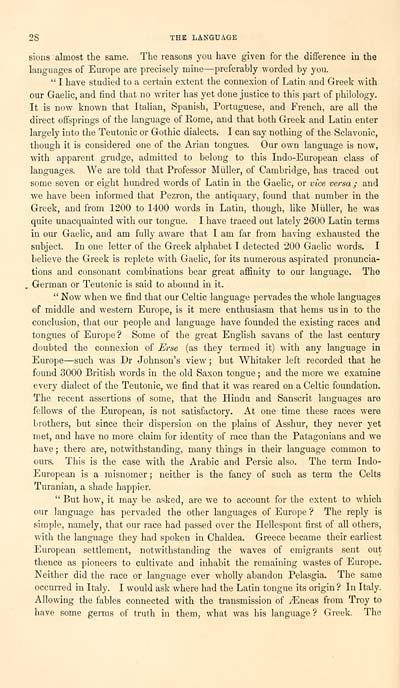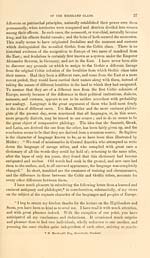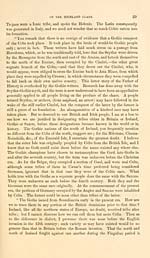Download files
Complete book:
Individual page:
Thumbnail gallery: Grid view | List view

28 THE LANGUAGE
sious almost the same. The reasons you have given for the difference in the
languages of Europe are precisely mine — preferably worded by you.
" I have studied to a certain extent the connexion of Latin and Greek with
our Gaelic, and find that no writer has yet done justice to this part of philology.
It is now known that Italian, Spanish, Portuguese, and French, are all the
direct offsprings of the language of Rome, and that both Greek and Latin enter
largely into the Teutonic or Gothic dialects. I can say nothing of the Sclavonic,
though it is considered one of the Arian tongues. Our own language is now,
with apparent grudge, admitted to belong to this Indo-European class of
languages. We are told that Professor Miiller, of Cambridge, has traced out
some seven or eight hmidred words of Latin in the Gaelic, or vice versa ; and
we have been informed that Pezron, the antiquary, found that number in the
Greek, and from 1200 to 1400 words in Latin, though, like Miiller, he was
quite unacquainted with our tongue. I have traced out lately 2600 Latin terms
in our Gaelic, and am fully aware that I am far from having exhausted the
subject. In one letter of the Greek alphabet I detected 200 Gaelic words. I
believe the Greek is replete with Gaelic, for its numerous aspirated pronuncia-
tions and consonant combinations bear great affinity to our language. The
. German or Teutonic is said to abound in it.
" Now when we find that our Celtic language pervades the whole languages
of middle and western Europe, is it mere enthusiasm that hems us in to the
conclusion, that our people and language have founded the existing races and
tongues of Europe? Some of the great English savans of the last century
doubted the conne.don of Erse (as they termed it) with any language in
Europe — such was Dr Johnson's view ; but Whitaker left recorded that he
found 3000 British words in the old Saxon tongue ; and the more we examine
every dialect of the Teutonic, we find that it was reared on a Celtic foundation.
The recent assertions of some, that the Hindu and Sanscrit languages are
fellows of the European, is not satisfactory. At one time these races were
brothers, but since their dispersion on the plains of Asshur, they never yet
met, and have no more claim for identity of race than the Patagonians and we
have ; there are, notwithstanding, many things in their language common to
ours. This is the case with the Arabic and Persic also. The term Indo-
European is a misnomer; neither is the fancy of such as term the Celts
Turanian, a shade happier.
" But how, it may be asked, are we to account for the extent to which
our language has pervaded the other languages of Europe ? The reply is
simple, namely, that our race had passed over the Hellespont first of all others,
with the language they had spoken in Chaldea. Greece became their earliest
European settlement, notwithstanding the waves of emigrants sent out
thence as pioneers to cultivate and inhabit the remaining wastes of Europe.
Neither did the race or language ever wholly abandon Pelasgia. The same
occurred in Italy. I would ask where had the Latin tongue its origin? In Italy.
Allowing the fables connected with the transmission of yEneas from Troy to
have some germs of truth in them, what was his language ? Greek. The
sious almost the same. The reasons you have given for the difference in the
languages of Europe are precisely mine — preferably worded by you.
" I have studied to a certain extent the connexion of Latin and Greek with
our Gaelic, and find that no writer has yet done justice to this part of philology.
It is now known that Italian, Spanish, Portuguese, and French, are all the
direct offsprings of the language of Rome, and that both Greek and Latin enter
largely into the Teutonic or Gothic dialects. I can say nothing of the Sclavonic,
though it is considered one of the Arian tongues. Our own language is now,
with apparent grudge, admitted to belong to this Indo-European class of
languages. We are told that Professor Miiller, of Cambridge, has traced out
some seven or eight hmidred words of Latin in the Gaelic, or vice versa ; and
we have been informed that Pezron, the antiquary, found that number in the
Greek, and from 1200 to 1400 words in Latin, though, like Miiller, he was
quite unacquainted with our tongue. I have traced out lately 2600 Latin terms
in our Gaelic, and am fully aware that I am far from having exhausted the
subject. In one letter of the Greek alphabet I detected 200 Gaelic words. I
believe the Greek is replete with Gaelic, for its numerous aspirated pronuncia-
tions and consonant combinations bear great affinity to our language. The
. German or Teutonic is said to abound in it.
" Now when we find that our Celtic language pervades the whole languages
of middle and western Europe, is it mere enthusiasm that hems us in to the
conclusion, that our people and language have founded the existing races and
tongues of Europe? Some of the great English savans of the last century
doubted the conne.don of Erse (as they termed it) with any language in
Europe — such was Dr Johnson's view ; but Whitaker left recorded that he
found 3000 British words in the old Saxon tongue ; and the more we examine
every dialect of the Teutonic, we find that it was reared on a Celtic foundation.
The recent assertions of some, that the Hindu and Sanscrit languages are
fellows of the European, is not satisfactory. At one time these races were
brothers, but since their dispersion on the plains of Asshur, they never yet
met, and have no more claim for identity of race than the Patagonians and we
have ; there are, notwithstanding, many things in their language common to
ours. This is the case with the Arabic and Persic also. The term Indo-
European is a misnomer; neither is the fancy of such as term the Celts
Turanian, a shade happier.
" But how, it may be asked, are we to account for the extent to which
our language has pervaded the other languages of Europe ? The reply is
simple, namely, that our race had passed over the Hellespont first of all others,
with the language they had spoken in Chaldea. Greece became their earliest
European settlement, notwithstanding the waves of emigrants sent out
thence as pioneers to cultivate and inhabit the remaining wastes of Europe.
Neither did the race or language ever wholly abandon Pelasgia. The same
occurred in Italy. I would ask where had the Latin tongue its origin? In Italy.
Allowing the fables connected with the transmission of yEneas from Troy to
have some germs of truth in them, what was his language ? Greek. The
Set display mode to: Large image | Transcription
Images and transcriptions on this page, including medium image downloads, may be used under the Creative Commons Attribution 4.0 International Licence unless otherwise stated. ![]()
| Early Gaelic Book Collections > Blair Collection > Treatise on the language, poetry, and music of the Highland clans > (40) |
|---|
| Permanent URL | https://digital.nls.uk/76236843 |
|---|
| Description | A selection of books from a collection of more than 500 titles, mostly on religious and literary topics. Also includes some material dealing with other Celtic languages and societies. Collection created towards the end of the 19th century by Lady Evelyn Stewart Murray. |
|---|
| Description | Selected items from five 'Special and Named Printed Collections'. Includes books in Gaelic and other Celtic languages, works about the Gaels, their languages, literature, culture and history. |
|---|

